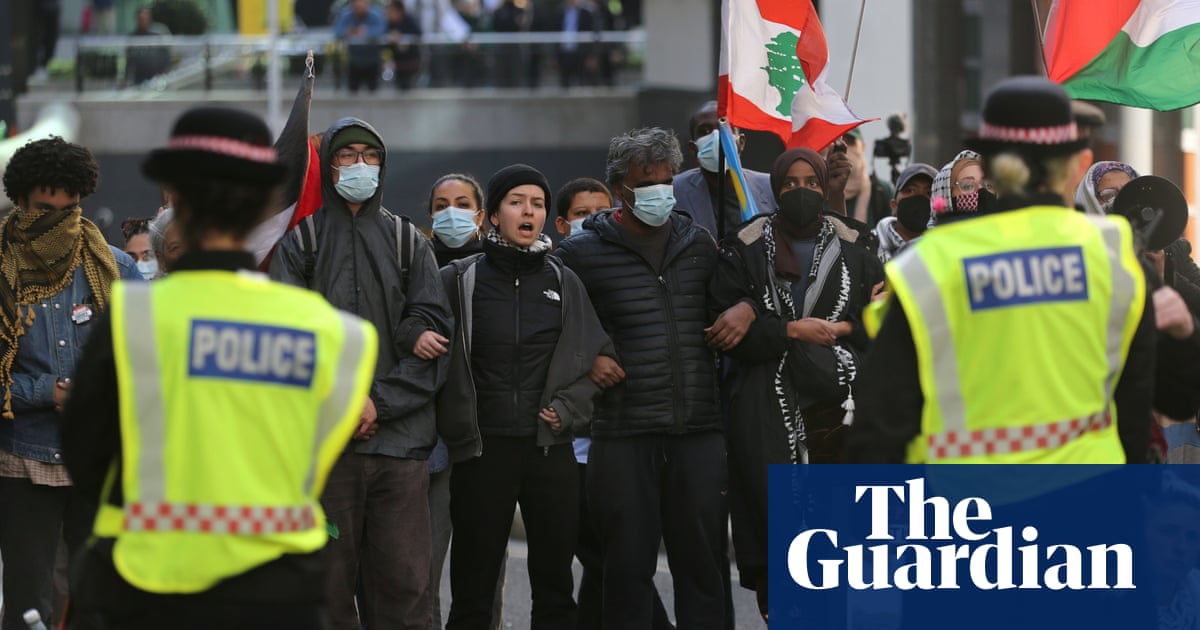The UK government shared contact details of counter-terrorism police and prosecutors with the Israeli embassy during an investigation into protests at an arms factory, official documents suggest, raising concerns about foreign interference.
An email was sent on 9 September last year by the Attorney General’s Office (AGO) to Daniela Grudsky Ekstein, Israel’s deputy ambassador to the UK, with the subject matter “CPS/SO15 [Crown Prosecution Service/counterterrorism police] contact details”.
Last August, 10 Palestine Action activists were arrested under the Terrorism Act after a protest at an Israeli weapons factory, and in November a further eight were arrested under the act in relation to the same incident. The email sent by Nicola Smith, the head of international law at the AGO, and obtained through a freedom of information (FoI) request, was sent 11 days after she had met Grudsky Ekstein. It was redacted apart from the subject matter.
Lydia Dagostino, from Kellys Solicitors, who represents some Palestine Action activists, said: “The information disclosed in response to an FoI request clearly raises questions and needs further investigation.
“Why, for example, did the Attorney General’s Office provide the contact details for the Crown Prosecution Service, an independent body, to the Israelis? What further exchanges followed and was there discussions about ongoing criminal prosecutions?”
Dr Shahd Hammouri, an academic and international lawyer, also raised concerns about evidence “which indicates foreign influence”.
A readout of what was discussed at the 28 August meeting between Smith and Grudsky Ekstein was heavily redacted. However, past disclosures have shown apparent requests by the Israeli embassy to the AGO to intervene in individual cases – unspecified due to redactions – and meetings held between the Israeli defence contractor’s representatives and the AGO and Home Office ministers.
In 2023, the Guardian revealed that in response to a redacted request from the Israeli embassy, the director general of the AGO, Douglas Wilson, replied: “As we noted … the CPS makes its prosecution decisions and manages its casework independently. The law officers are unable to intervene on an individual case or comment on issues related to active proceedings.”
Wilson was also present at the meeting in August last year with Smith and Grudsky Ekstein.
A 2023 briefing note for a meeting between Chris Philp, then a Home Office minister, and the Israeli embassy said the CPS declined to attend the meeting “to preserve their operational independence”.
Huda Ammori, co-founder of Palestine Action, said: “The timing of this correspondence coincides with the ongoing investigation into Palestine Action activists accused of dismantling the […] site of Israel’s biggest arms producer.
“It seems apparent that the Attorney General’s Office has facilitated foreign interference in this case and potentially other ongoing criminal cases.”
In November last year, four UN special rapporteurs wrote to the UK government expressing concern about the “apparently unjustified use” of terrorism legislation against protesters. People arrested under the Terrorism Act 2000 can he held for up to 14 days without charge.
The letter from the human rights experts said those arrested in August were initially held for 36 hours, without access to legal representation, before being detained for a further seven days under powers contained in counter-terrorism legislation.
The letter said: “Counterterrorism legislation, including the Terrorism Act 2000 and the Terrorism Act 2006, appears to have been increasingly used in the context of domestic support for Palestinian self-determination and political activism against the United Kingdom’s foreign policy on the conflict in the occupied Palestinian territory of Gaza.
“In particular, members of Palestine Action – a grassroots movement that organises direct actions against Israeli weapons factories in the United Kingdom – have reportedly been arrested under counter-terrorism legislation for conduct that appears to be in the nature of ordinary criminal offences and does not appear to be genuinely ‘terrorist’ according to international standards.”
No one was charged with offences under the Terrorism Act in relation to the protest. The 10 people charged with non-terrorism offences have had their legal support, family visits, healthcare and religious rights limited while in prison awaiting trial, according to the special rapporteurs’ letter.
A government source said: “It has been routine under successive governments for AGO to help embassies get in contact with the relevant authorities purely for purposes of sharing information that could be relevant to a case.
“Decisions to prosecute, convict and sentence are, rightly, made independently of government by the Crown Prosecution Service, juries and judges respectively.”
The Israeli embassy did not respond to a request for comment. Relating to a separate case, an Israeli embassy spokesperson previously said it respected the independence of the British judicial system and “under no circumstances would interfere in UK legal proceedings”.
